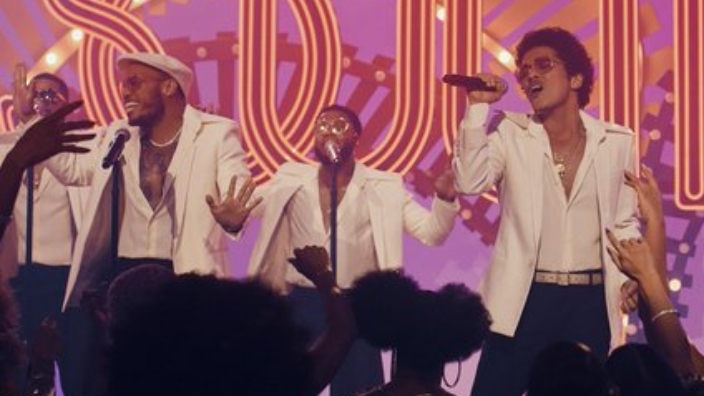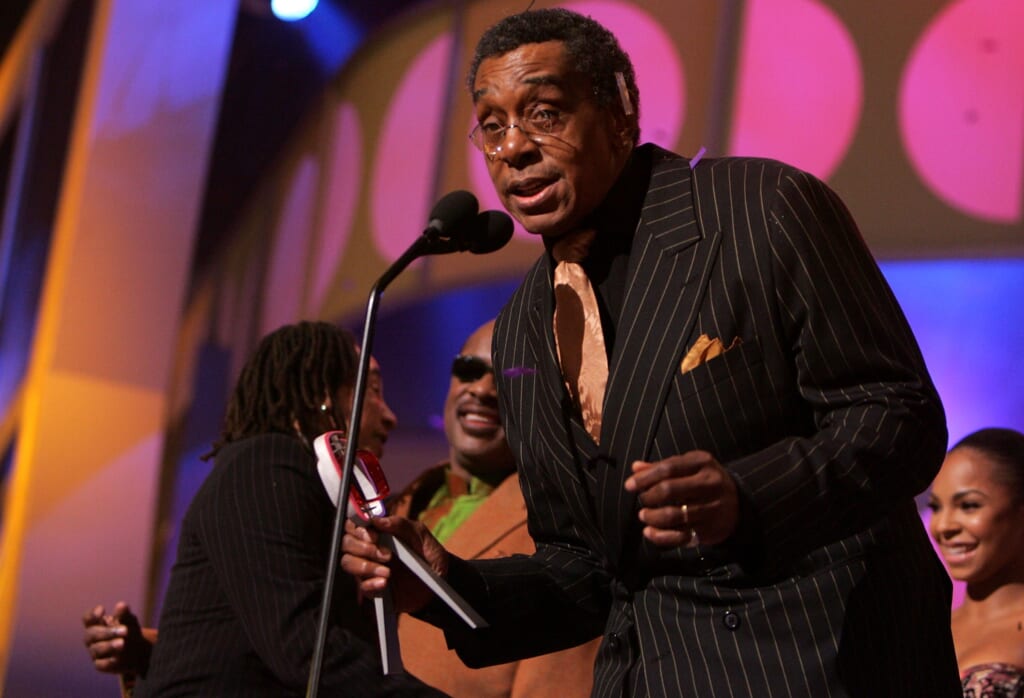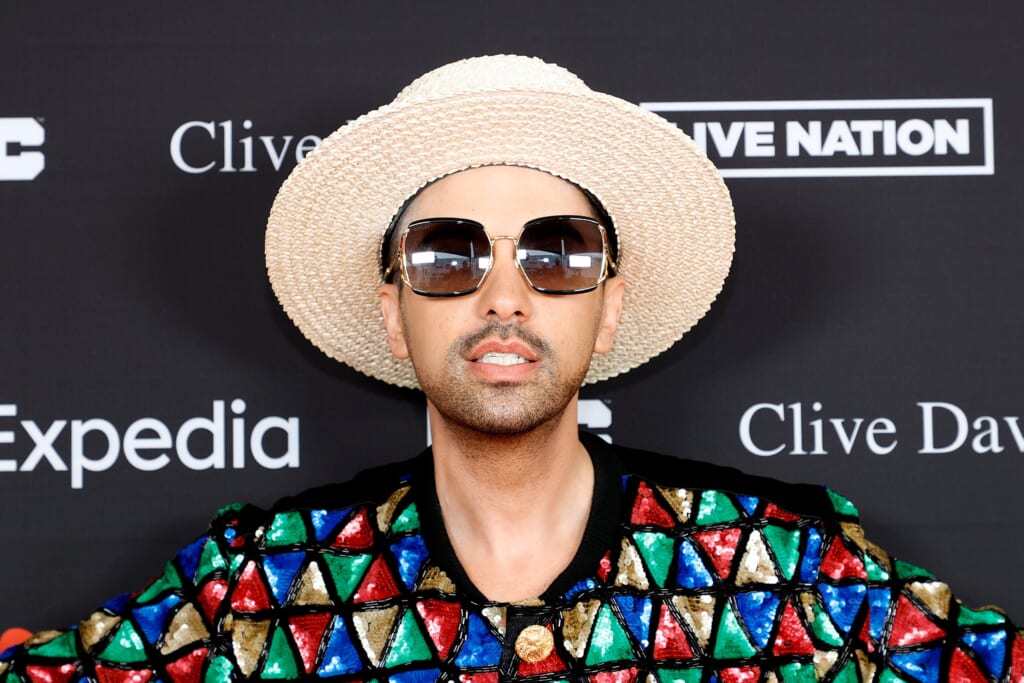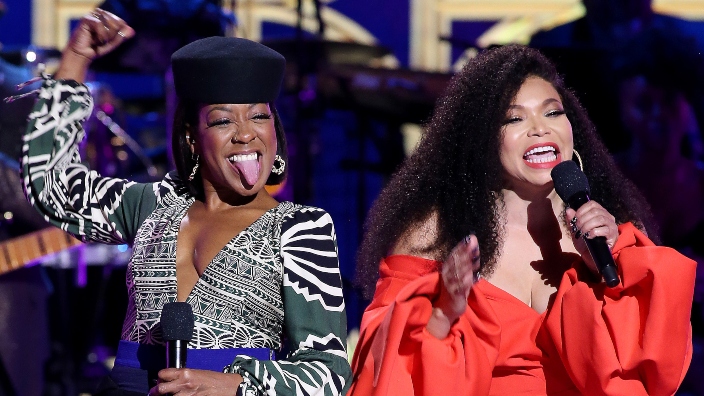The 2021 Soul Train Awards exemplified the rich heritage of Black institutions
OPINION: Holding the Soul Train Awards at the Apollo Theater for the first time illustrates how much Black artists still need a shared, safe space.
On a brisk Saturday evening in November, as the sun was setting, a parade of sharply dressed Black folks made their way to the world-famous Apollo Theater for a night out.
The bright red lights of the Apollo sign can be seen as clearly from the corner of Frederick Douglass Blvd. and 125th St. as if you were standing right in front of it. Its marquee marked what was going on inside – the 2021 Soul Train Awards.
The lauded halls have never hosted this long-running ceremony until now. The Apollo and Soul Train Awards are among the most revered institutions in the history of Black arts and entertainment and last weekend they were irretrievably linked for the first time.
The Soul Train Awards was held on the West coast until this year when it moved to New York City for the first time. As attendees made their way to their seats, they passed collages of Black Apollo legends on the walls — Sammy Davis Jr, The Four Tops, James Brown, Nina Simone, Moms Mabley — and so many others who have graced the legendary stage.

When Don Cornelius brought Soul Train to the world in 1971, he, like the Apollo, provided a platform for Black performers like Gladys Knight and the Pips, Curtis Mayfield, Al Green, and so many others on what became one of the longest-running syndicated television shows in American history.
Rather than waiting for the Grammys and other award ceremonies to give Blacks the recognition they deserved as white artists who copied them walked away with all the trophies and residuals, the Soul Train Awards gave acts like Patti LaBelle, Alexander O’Neal, and Bobby Brown the flowers they deserved.

El DeBarge, who helped open the 2021 show credits Cornelius with helping DeBarge stay in the public eye.
“I thank God for Don Cornelius,” DeBarge told theGrio. “He was a visionary. We didn’t have a lot of videos out for Motown. So Don made sure he kept us visible.”
But Soul Train wasn’t only about the new music. The famed dancers introduced the nation to the latest, freshest dances and looks from Black culture that otherwise wouldn’t have been seen on a national platform.
Suffice it to say, had it not been for shows like Soul Train, Black music might not have had the impact on society that it does today. DJ Cassidy, who brought his “Pass The Mic” program to this year’s award show, agrees.

“For 50 years, Soul Train brought soul music, R&B, music, hip hop music to the world in a way that transformed the global culture,” Cassidy told theGrio. “Not only through song, but through dance, through fashion. Soul Train really changed the way people walked and people talked.”
Even today’s generation understands the significance of a venue like the Apollo for Black artists. Tisha Campbell, co-host of The Soul Train Awards four years running, says it’s essential to the Black community.
“It’s a safe place for us to go,” Campbell told theGrio. “It’s in our neighborhoods. It’s a part of our legacy and history, from the Harlem Renaissance [onward]. The Apollo Theater is an important part of our culture.”
From The Temptations to Mary J. Blige, from DeBarge to Alicia Keys, the Apollo still draws so many major acts. PJ Morton, who’s performed on the Apollo stage in the past, says he feels the ghosts of performers past, not only on the stage but backstage and in the dressing rooms, too.

“Knowing that James Brown was here, Ray Charles, like, everybody, you can think of that you ever looked up to in music, [has] been here,” Morton told theGrio. “I think that stays in the walls and in the room, you know, so it’s just such an honor. And for me, if I feel like I’m standing on those shoulders, it just makes me want to be great any time I’m in this room, for sure.”
This is why it was so fitting that the awards opened with Silk Sonic performing against a pitch-perfect backdrop of the Soul Train television stage from its 70s heyday.
The fact that Bruno Mars, one of the biggest pop stars in the world, was playing funk music with one of the most talented, under-championed musicians today in Anderson .Paak without seeming out of place only further illustrates Soul Train’s influence and the Black artistry it showcased over its 36-year-run.
After hearing the heartfelt acceptance speeches from Sullivan, Ashanti, and Maxwell, it’s clear that both the Soul Train Awards and the Apollo Theater are still very much crucial to fostering the acclaim of Black artists as well as providing them with a home where they can feel themselves. With recent performances by H.E.R., Keys, and a concert by Lizzo this Friday, the Apollo is as hot as its ever been.
“Right now, [the Apollo’s] here for this generation, and I think it’s gonna be here forever,” DeBarge continued. “It’s not just for the 60s and 70s. It’s here today and I think in our fiber, our musical fiber. It’s part of our DNA.”
Have you subscribed to the Grio podcasts, Dear Culture or Acting Up? Download our newest episodes now!
TheGrio is now on Apple TV, Amazon Fire, and Roku. Download theGrio today!
The post The 2021 Soul Train Awards exemplified the rich heritage of Black institutions appeared first on TheGrio.
from TheGrio https://ift.tt/3G6kj7i

No comments: